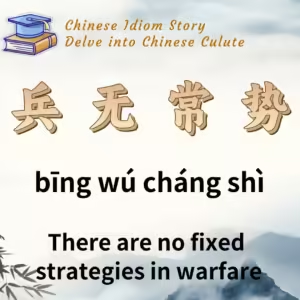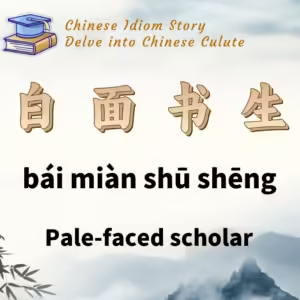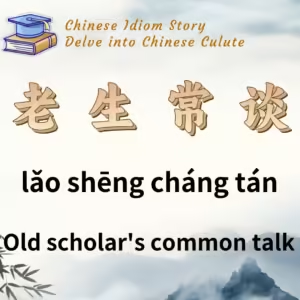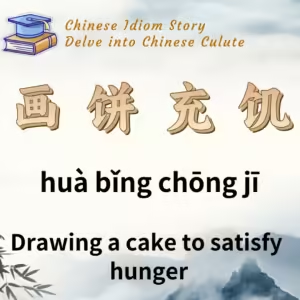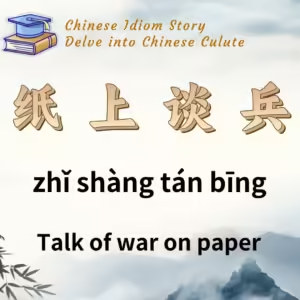
Chinese Idiom: 纸上谈兵 (Zhi Shang Tan Bing)
English Translation: Talk of war on paper
pīn yīn: zhǐ shàng tán bīng
Idiom Meaning: Refers to someone who only talks about theoretical strategies without practical experience, often boasting without the ability to solve real problems.
Historical Source: “Records of the Grand Historian” (《史记·廉颇蔺相如列传》).
Idiom Story:
Zhao Kuo was a famous general of the Zhao state during the Warring States period and the son of the renowned general Zhao She. From a young age, Zhao Kuo studied military tactics and spoke at length about military affairs, believing himself to be unmatched in skill.
One day, while discussing military command with his father, Zhao She found it difficult to counter Zhao Kuo’s arguments but refrained from praising him. Concerned, Zhao Kuo’s mother asked Zhao She about this. He expressed his worries, stating, “Warfare is inherently complex and dangerous, yet Zhao Kuo discusses commanding battles as if it were simple. If he leads our troops in battle, he will surely lead Zhao State to ruin.”
After Zhao She’s death, in 262 BCE, the Qin army attacked Zhao’s Shangdang. King Zhao Xiaocheng appointed the experienced general Lian Po to defend against the Qin forces. After several initial defeats, Lian Po adapted his strategy by fortifying positions and holding his ground. The standoff lasted three years, during which the Qin army faced supply issues and growing discontent.
The Qin strategists spread rumors that the Qin army feared only Zhao Kuo, leading King Zhao Xiaocheng to consider replacing Lian Po with Zhao Kuo. The ailing minister Lian Xiangru urgently advised against this, citing Zhao Kuo’s lack of experience and reliance on empty talk. Zhao Kuo’s mother, recalling Zhao She’s warning, also cautioned against promoting him, but King Zhao Xiaocheng insisted on his decision.
Once in command, Zhao Kuo drastically changed Lian Po’s tactics and dismissed numerous officers. The Qin general Bai Qi seized this opportunity to launch a surprise attack on Zhao’s camp at night, feigning retreat and cutting off Zhao’s supply lines. Unfamiliar with the situation, Zhao Kuo pursued blindly, leading to a disastrous encirclement of the Zhao army.
After over 40 days of starvation, Zhao Kuo led an elite unit out to confront the Qin forces, only to be shot and killed in battle. The Zhao army fell into chaos, resulting in the execution of over 400,000 soldiers. The following year, the Qin forces nearly captured Handan, putting Zhao State on the brink of collapse. Ultimately, it was only the assistance of the Chu and Wei states that saved Zhao from destruction.
During the Ming Dynasty, a scholar named Liu Sanwu composed a poem mocking Zhao Kuo, with a line that stated, “Even the court and the common people praise the soldiers on paper,” underscoring the futility of his theoretical approach to warfare.


